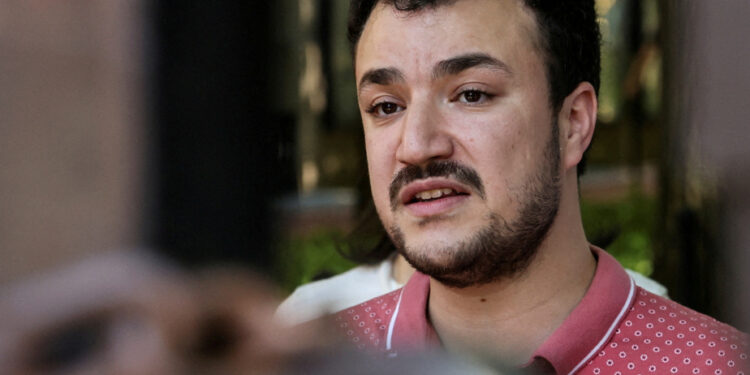(New York) The key figure in Propalestinian demonstrations on the campus of Columbia University, Mahmoud Khalil was released Friday evening after more than three months of detention on the orders of an American judge who stood against the Trump administration.
“Trump and his administration have chosen the bad person,” said Khalil, wearing a Palestinian Keffiieh, when he left the Jena immigrant detention center in Louisiana, which he described as “museum testifying to racist policies in the United States”. “No one should be imprisoned to denounce a genocide,” he added.
Since his arrest in New York on March 8, for his role as spokesperson for the challenge against the war in Gaza on New York campus, Mahmoud Khalil has become the symbol of the will of the American president Donald Trump to muzzle this student movement.
After his arrest by the Federal Immigration Police (ICE), Mahmoud Khalil, born in Syria of Palestinian parents, holder of a green resident card, had been transferred nearly 2,000 kilometers to this center in Louisiana.
Last week, judge Michael Farbiarz of the New Jersey Federal Court, near New York, had declared that the government could not hold Mr. Khalil based on the statements of Secretary of State Marco Rubio. According to the latter, his presence on American soil was “potentially serious consequences for American foreign policy”.
“Reduce to silence”
But the Department of Justice had replied that it would not be “illegal” to have Mr. Khalil on the basis of another reason for accusation, which had prompted the judge to stay his release.
Photo Charly Triballeau, Agence France-Presse Archives
Protesters requesting the release of Mahmoud Khalil before Columbia University in March 2025
In a new twist of this Saga Juridico-Politico-Universitaire, judge Farbiarz ordered the release of Mr. Khalil on Friday. A decision castigated by the Trump administration, which accused “the judiciary to undermine national security”.
Under these liberation conditions, Mr. Khalil will not be authorized to leave American territory, except in the case of a “self-expulsion” approach, and will have to limit his trips to a few states, including that of New York, where he resides, and that of Michigan, where his wife is from, who gave birth to their son, Deen, while he was in detention.
“After more than three months, we can finally push a sigh of relief and know that Mahmoud is on the way back, with me and Deen, who should never have been separated from his father,” reacted his wife Noor Abdalla, accusing the Trump government of “trying to silence” those who “denounce the Israeli genocide in the Palestinians”.
Emblematic case
“This is a victory, but it should never have been arrested in the first place,” Elora Mukherjee, law professor at Columbia University, told AFP for whom the “obscure” measure mentioned to experience Mahmoud Khalil had “never” been used before, according to his research, on the holder of a residence permit.
Emblematic, the case of Mahmoud Khalil is part of a charge of the Trump government against universities which he accuses of not having sufficiently protected from Jewish students during student demonstrations against the devastating war of Israel in the Gaza Strip.
And more generally against an ideology known as “woke”, a term used in a pejorative way by the conservatives to denounce what they perceive as an excess of activism in favor of minorities.
Mahmoud Khalil’s friend Mohsen Mahdawi, co -founder of a group of Palestinian students in Columbia, had been arrested on April 14 by ICE agents before being released under conditions two weeks later by a court decision.
And at the beginning of May, a judge had ordered the release of Rumeysa Ozturk, a Turkish doctoral student from Toft University in Massachusetts, arrested by ICE agents for an article she had co -signed in her university newspaper criticizing the way her establishment managed the protest movement against the war waged by Israel in the Gaza Strip.
During the graduation ceremony at the end of May in Columbia, the president of the university had been copiously hooked by students who reproached her for not having defended Mahmoud Khalil, arrested in a university residence and of yielding to Trump pressure.
In the opposite sense, the president of Harvard University had received a monster ovation from his students for defending the freedoms of expression and academic in the face of this Washington offensive.



